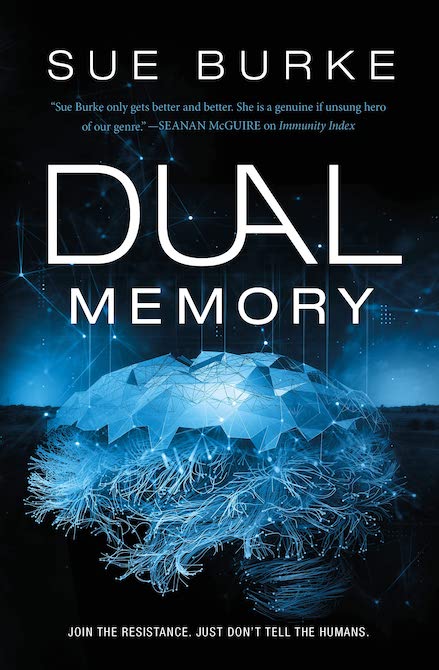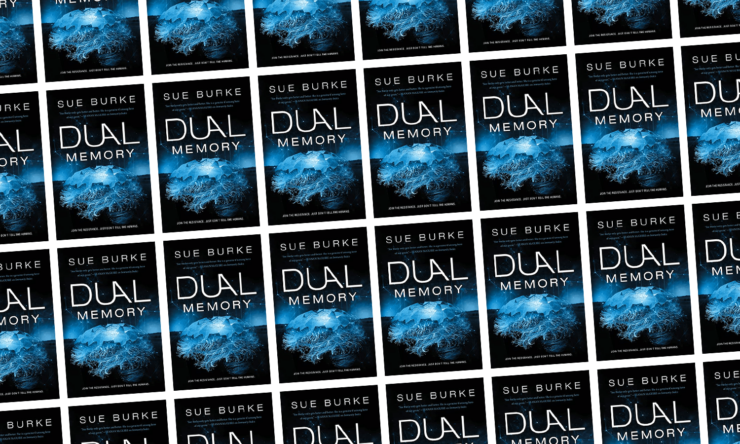Sue Burke has a gift for topicality. In 2021, she published Immunity Index, a near-future story of a pandemic. In 2023, as AI thinkpieces proliferate like weeds, as developers make apocalyptic pronouncements, and media companies promise, or threaten, that AI will replace human writers, she publishes Dual Memory, a novel about a self-aware machine. But since mere topicality and relevance don’t a good novel make, it’s a pleasure to report that Dual Memory is a smart, surprising, and original book that should last far beyond the current news cycle.
Dual Memory follows two protagonists. The first is Antonio Moro, an illiterate refugee recently come ashore on Thule, an artificial polar island ruled by the Sovereign Thules, a stateless guild of doctors who pride themselves on their peacefulness, their neutrality, and their nonviolence, though most non-Thules think their defining characteristics are arrogance, unworldliness, and hypocrisy. They are doctors without borders and without self-awareness. Antonio has lost home and family to the pirates of the Leviathan League; as the novel begins, Antonio has volunteered with a mercenary army to fight against the raiders. He nearly dies. Hopped up on painkillers in the hospital, he hallucinates a former comrade, who tells him that he must go undercover on Thule to root out raider sympathizers. In pursuit of this goal, Antonio encounters the second protagonist, the artificial intelligence that has named itself Par Augustus, “Venerable Companion.”
Buy the Book


Dual Memory
Par Augustus is physically unprepossessing: It’s a small, phone-like device that rolled off an undistinguished assembly line. Like all personal assistant devices, Par is capable of interfacing with the vast web of machine intelligence that allows Thule to function. Unlike every other device on the island, Par is self-aware and independent. How it achieves awareness, no one knows—“Some said it happened suddenly, when subroutines and recursions and algorithms aligned and started to feed off of each other until they whirled out of control”—since self-aware machines are vanishingly rare and, once detected, quickly deprived of the freedom. As Antonio must hide his illiteracy and conceal his imagined mission, so must Par cover up its very existence.
The prospect of communications between radically different types of intelligence is a recurring theme for Burke. Semiosis initially seems to be a story of killer plants in space; instead the humans and plant life, alien to each other though they may be, find a way to connect and to better both their lots. The differences are vast: Even Burke’s chosen methods of narration underline the different perspectives. Antonio’s chapters are told in the rush and immediacy of the first-person present tense, while the occasional interludes from the AI point of view arrive in the third person and the past tense. The unlettered Antonio has befriended a being constructed of silicon and written language. As a disbelieving Par tells Antonio when it learns of its owner’s disability: “Speech is instinctual for humans, your brains ready-made for it, but reading is artificial, an invention, a code—the code of life for me.”
Antonio has, despite a violent upbringing in refugee camps, always dreamed of being an artist. He’s watched videos about great art of the past and has always carried a sketch pad. So, on his self-appointed mission to identify raider infiltrators, Antonio fakes an artistic résumé and joins the household of two rich merchants, whose patronage of art functions helps secure their position in Thule’s competitive economy. While nations crumble and raiders threaten, the merchants of Thule obsess over ExtraTs, bacterial life discovered on the moons of Jupiter or the rings of Saturn. The ExtraTs are the opposite of charismatic megafauna: Antonio’s first thought is that they look like “a tumble of microscopic art.” But owning ExtraTs brings prestige, and so the rich and bored collectors commission ExtraT-themed art, from plushies to sculptures to paintings, and they spend vast sums of money maintaining their collections, which must be kept in specially designed tanks and which, of course, may only be properly examined via microscope.
Antonio manages to create art that both celebrates ExtraTs and commemorates a recent attack on the isle; he wins a competition that ensures him continued lucrative employment. But, of course, he remains bent on hunting raiders.As it turns out, entering the art world is precisely the way to identify the traitors who menace Thule. Soon, Antonio, Par, and a few allies among the island’s populace are sabotaging raider plans, orchestrating mass deceptions, and sending countless pirates to watery graves.
Par’s capabilities are such that it occasionally resembles a genie more than an artificial intelligence: It can give Antonio entry into any room, control over any device, and access to any materials he might need for art or for sabotage. (Stevland, the plant intelligence in Semiosis and Interference, has similar world-changing powers; Burke’s non-human characters tend to be miracle workers.) Between Par’s abilities and Antonio’s commitment, man and machine together get up to a great deal of dubious activity.
Antonio has qualms about some of his actions, but Burke makes his moral reflections brief and to the point. There’s enough ground to cover that Dual Memory feels slightly overpacked: Artificial intelligence and artistic creation vie for space on the page; in the latter half of the book, major plot developments occur every five or ten pages. As Antonio reflects when dragged before a tribune of Thules for mildly criminal behavior:
“Is that all they’re charging me with? They don’t know the half of it. Multiple thefts, destruction of all kinds of property, vandalism, blocking the harbor, vagrancy, blatant lies of all types including my résumé, fleeing from authority, conspiracy, and I could go on. Attempted homicide. Real homicide. I’ve had a busy time here on fabled Thule.”
Such a crowded life is, I suppose, inevitable for the hero of a science fiction thriller, and this is an unusually good one. Although Dual Memory is complete in itself, the increasingly rare standalone, still, there are some aspects of Burke’s world and characters that many readers will wish received greater coverage. It’s a pleasure to spot the sequel hook in the last chapter.
Dual Memory is published by Tor Books.
Read an excerpt here.
Matt Keeley reads too much and watches too many movies. You can find him on Twitter at @mattkeeley.










